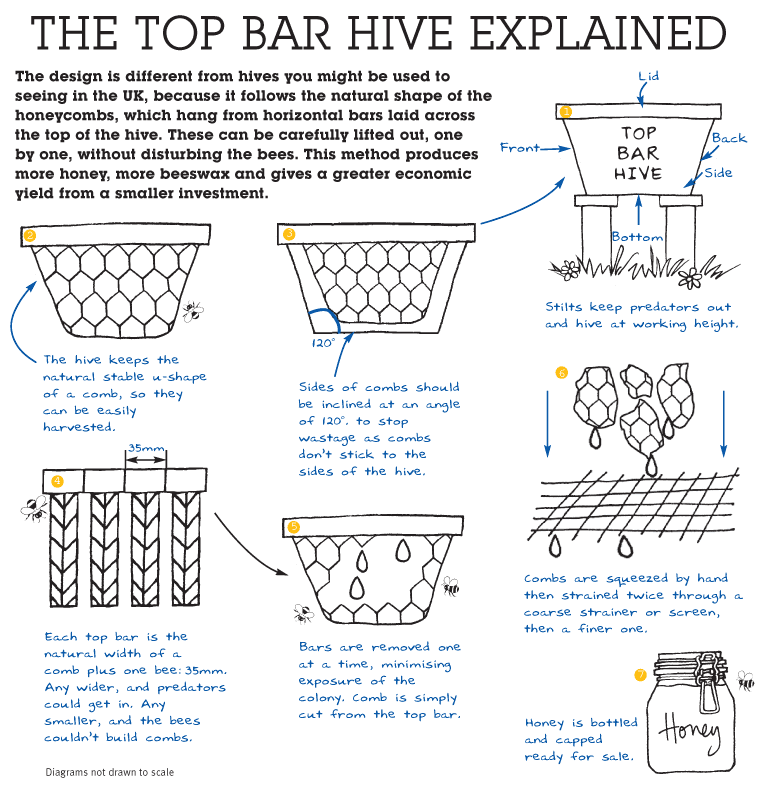Table of Contents
Food & Farming
Permaculture
Permaculture is a practical design philosophy intended to help us live and prosper in an environment, while working with nature in a positive way, using solutions based on careful observation of natural ecosystems and common sense.
- What is Permaculture? (YouTube) - Our Changing Climate
- Permaculture Lecture Series (Vimeo) - Bill Mollison
- Earth Care Library - lots of free books on permaculture and plants
Principles
How-Tos
- Hügelkultur - A mound garden bed made of nothing wood covered with other compostables and dirt. Requires no digging, tilling, watering (except in droughts), or fertilizing.
- Keyhole garden - A raised bed incorporating an active compost bin in the center, removing the need for fertilizing. Designed to work even in harsh climates and with poor soil.
- Ruth Stout method - Also called “no work gardening,” it only requires a thick layer of hay or another mulch over your seeds and… that's it. No digging, tilling, watering, or fertilizing, and the weeding process is easy and rare.
- Herb spiral - A very productive and time-efficient raised garden design, creating a series of different micro-climates perfect for a variety of herbs.
- Three Sisters - A traditional Iroquois technique where corn, squash, and beans are planted together, increasing production of all three while reducing labor and material input.
- Food Forests - a video (14 mins) exploring how to grow 200 perennial vegetables in the cold climate of Massachusetts, on one tenth of an acre.
- Plant Guilds - Bryce Ruddock
- Slow Food Foundation - for the preservation of biodiversity in foodstuffs
Plants
General Guides
- Plants For A Future - An incredible index of over 7,000 plants including instructions on growing and using plants for food, medicine, clothing, construction, etc.
- Practical Plants Wiki - A collaboratively edited encyclopedia and database of information on plants cultivated with a practical intention. Over 7400 plant articles covering edible, medicinal and material uses, propagation and cultivation information, plant associations and polycultures, and everything else you need to know to grow and benefit from practical plants.
- Food Not Lawns by Heather Jo Flores
- The Ark of Taste A collection of testimonies of traditional knowledge from around the world, with descriptions of products and local breeds
- Experimental Farm Network “The Experimental Farm Network (EFN) facilitates collaborative plant breeding and sustainable agriculture research”
Simple foods to grow at home
Sprouts
Sprouts are very easy to grow at home. Alfalfa seeds, mung beans, chickpeas and many others provide great nutrition while costing very little and taking almost no time at all to get started.
Soak the seeds / beans in water overnight, then put them (damp) into a clean jam jar and rinse at least every day. They should start sprouting pretty quickly and can be eaten after a few days (at whatever stage you want really). If kept in the fridge once ready, they should keep longer as it slows their growth.
Be aware of salmonella and E. coli: unclean practices and leaving the sprouts too long without rinsing increases the likelihood of getting food poisoning. Keep jam jars clean and rinse the sprouts often.
Basil
Basil is a plant that under the right conditions can exponentially propagate. Take cuttings of a plant, with some yield, and put them in water. Once the roots have grown long, transplant each of the cuttings into pots. This can be repeated enough times to quickly grow more than you can eat.
Greenhouse
- Thermal Mass Greenhouse
- Cold Frame
Afforestation
Afforestation is the establishment of a forest or stand of trees in an area where there was no previous tree cover.
How-Tos
- The Miyawaki Method - A plan for creating a resilient and long-lasting forest in any environment.
- The Green Conspiracy “In the long run, we want to make our cities greener and get more people aware of how easy and simple it is to grow edible plants as a hobby.”
Vertical Farming and Hydroponics
- A pool noodle can be used as a cheap grow medium by @teslas_moustache@sunbeam.city
Planting
Water Management
Composting
- What is Bokashi? by RadioAngel@cafe.sunbeam.city.
- ShareWaste - Find someone nearby to give your scraps to, or offer your compost bin for your neighbor's scraps.
Guerilla Gardening
- Guerilla Grafters manual - Learn how to attach fruit-bearing branches onto pre-existing ornamental trees in your community.
Warnings
- 60 years of farming left - Scientific American
Animals
Beekeeping
- 38 DIY Bee Hive Plans with Step-By-Step Tutorials - Morning Chores
- DIY Top Bar Hive from a Plastic 55gal Barrel - Lady Lee's Home
- Bee trapping - keepingbee.org
Chickens
- How to Build a Pallet Chicken Coop: 20 DIY Plans - Guide Patterns
- How To Raise Chickens - BackYard Chickens
- Using Chicken Manure Fertilizer In Your Garden - Gardening Know How
- How to Pasteurize Eggs - wikiHow
Goats
Goats are versatile, hardy, and smart. In addition to their meat and milk, they are excellent at clearing brush. Their resilient nature and browsing habits make them perfect for dry areas.
There are two main types of goat breeds: meat, and dairy. Below are the most common breeds in each category:
- Dairy breeds:
- Meat breeds:
Some helpful links about raising goats:
- The Free Range Life: The Complete Quick Start Guide to Raising Goats
- Weed'em and Reap: Daily goat routine
Veganism
- Add resources on veganism here.
Mushroom farms
- Add resources on mushroom farms here.
Aquaponics
- Add resources on aquaponics here.
Cricket Farms
- Add resources on cricket farms here.
Tools
- Farm Hack - A worldwide skill share among farmers who build and modify their own tools.
- Global Village Construction Set - A number of open-source machine designs for farming, and all the other foundations and comforts of modern life.
Preservation and Preparation
Techniques and Equipment
- Build a Rocket Stove from Concrete Blocks - Attainable Sustainable
- Build a Mini Rocket Stove from Upcycled Tin Cans - treehugger
- The Dakota Fire Hole - Survival Topics
- Plans for Solar Cookers - solarcooking.org.
- 10 Solar Cookers That Work at Night - Engineering For Change
- If We Insulate Our Houses, Why Not Our Cooking Pots? (cloudy weather backup) - Low Tech Magazine
- Well-Tended Fires Outperform Modern Cooking Stoves (cloudy weather backup) - Low Tech Magazine
- The Simple Art of Making an Earth Oven - Permaculture Magazine
- How to Build an Earth Oven - Youtube Video
- Awesome Agriculture Open source technology for agriculture, farming, and gardening
Bread
- Homemade bread tips - grossrabbit.tumblr.com, Peter Moorwood, and others
Canning
- Canning Vegetables in the Home (1909) - A basic canning manual, comes with illustrations and explanations, as well as things to avoid to prevent spoilage.
- Home Canning of Fruits, Vegetables and Meats (1942) - A more comprehensive manual from the US Department of Agriculture, covering much of the above but in more detail and with fruits and meats in addition to vegetables.


